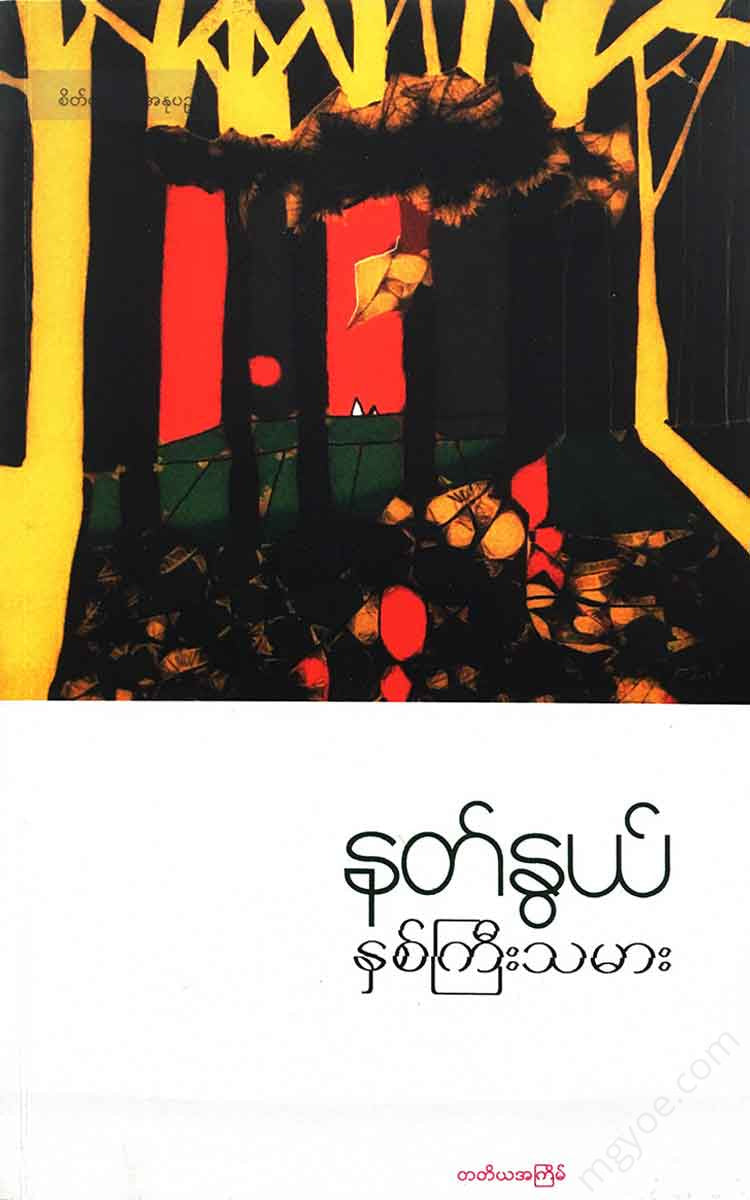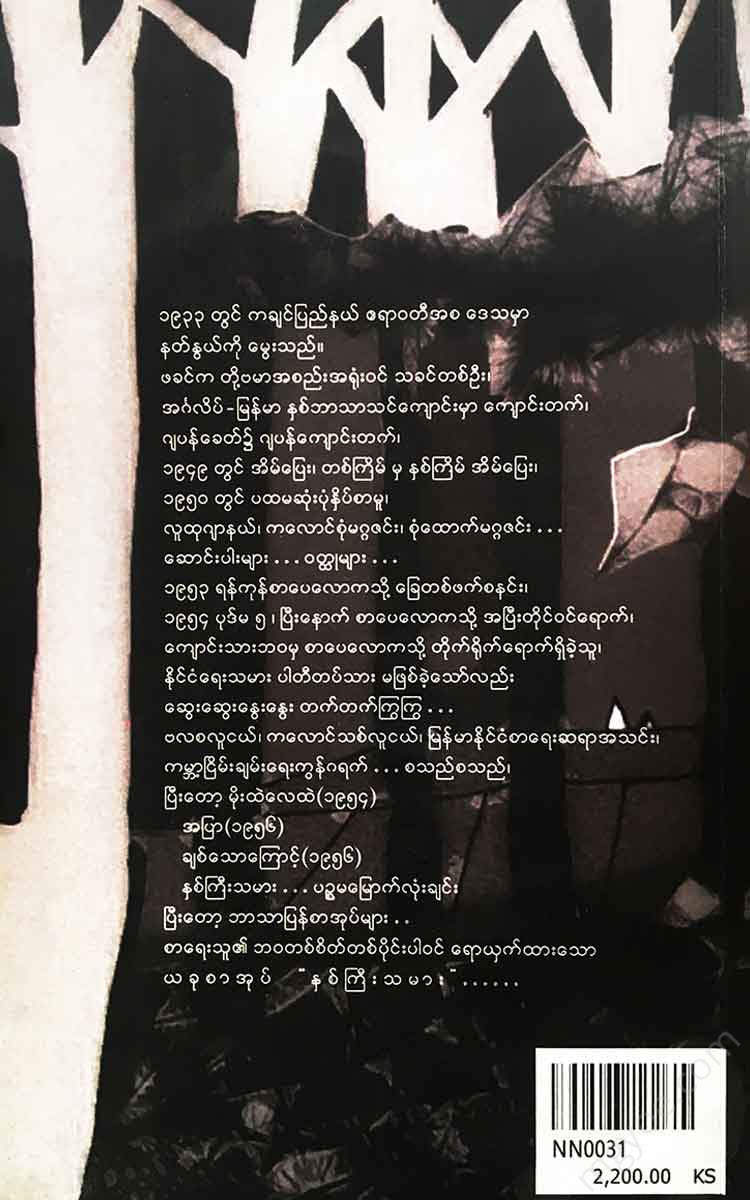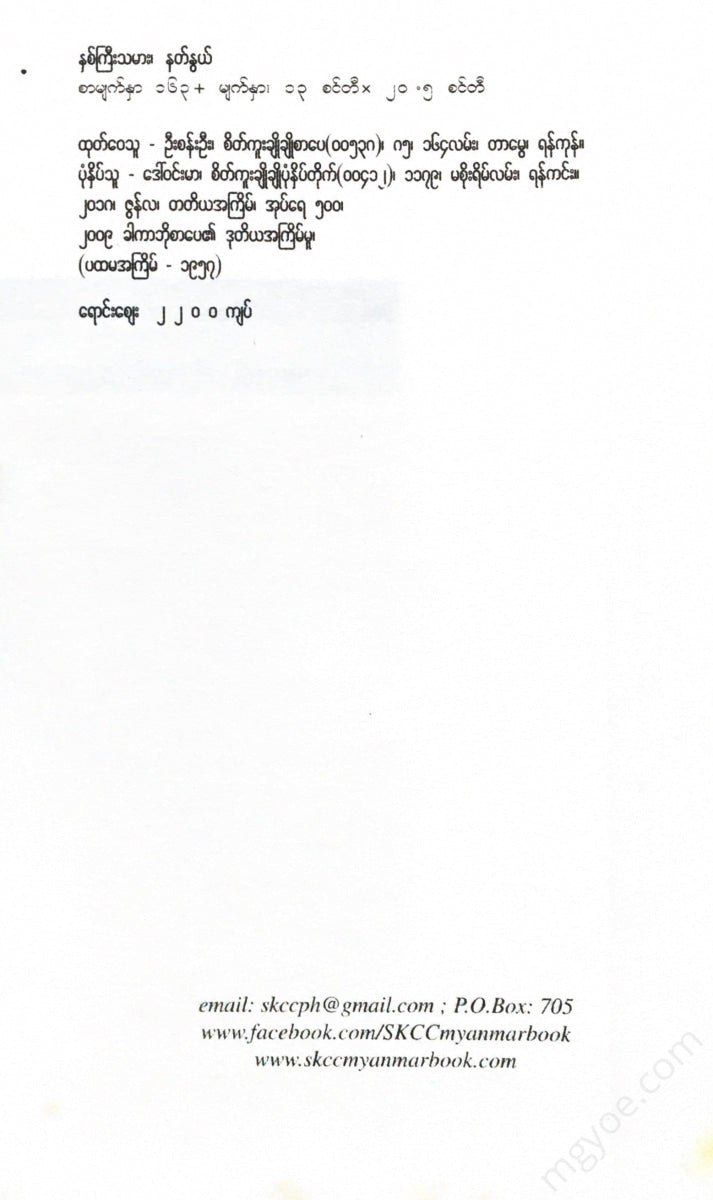စိတ်ကူးချိုချိုစာပေ
Nat Nwe - The Great Teacher
Nat Nwe - The Great Teacher
Couldn't load pickup availability
1. Forward
It will be dawn soon.
I couldn't stand the thought of being in a state of constant sleep. I threw off the blanket and got out of bed.
"Man... can you wake up?"
The old woman, who had to sleep in a single blanket, asked. The old woman didn't seem to sleep well all night. She had a bad cough. She must have been awake before I woke up. She must have woken up when I got up. In any case, the old woman was fast asleep.
It's also because I'm older and I don't sleep well. And I don't trust things.
"Yes....I'm going out."
"Be careful, you snake."
"The moon is shining, and the rain is about to come"
I got off the bus. It was very cold and I put on my collar, which was loose. Both shoes were missing from where I had taken them off last night. One was lying on its side and I had to find the other about three steps away. I was relieved that the dog had not carried it away. It must have been someone who had fought.
I went to the water closet first and drank a glass of water. It was a new water closet, and the water smelled.
"Don't go towards the bamboo groves, go towards the shore, do you hear me, man?"
My father spoke again, and it became clear that I was not the only one awake. Our family of four was sleeping in a big tent, facing north and south.
“Yes”
My mother must be waking up too, but she didn't say anything to me.
I heard a loud noise from the house. It seemed like the owners had woken up. I went out and lit a lamp from the house.
In the empty space in front of the house, there was a large pile of our belongings. We had piled up two carts of belongings, covered with rough mats, and covered with logs to keep the wind from blowing them over.
In fact, this empty space is a threshing floor. To the west of the pile of goods is an overturned cart house, and the two are under a tamarind tree.
As I emerged from between the cart and the pile of goods, I heard a rustling sound from inside the bamboo hut leaning against the mango tree near the entrance. I couldn't see anything. I couldn't tell if it was a tortoise or a snake. Snakes often come in bamboo huts. That's why my mother warned me.
Here, snakes are called “long snakes.” We, who are from another place, often call them snakes as if they were broken. We can’t call them that, because they call them snakes, that’s why we call them that.
They don't lose face. There is an animal in that area that cannot be named. It is the tiger. The "Tapan Lord" who rules the Tapan Mountains says he doesn't like it. Even the puppets can't use the tiger. We don't use the word tiger because we feel sorry for the villagers. My father also made us strictly follow it.
However, whenever my father and I were alone on the mountainside, he would...
"People, don't believe in such things, a tiger is a tiger, who should we be afraid of? These spirits are useless. But the hard part is that you have to be kind to your fellow villagers, right? Don't make them feel bad."
I walked through the clearing, removed the top two rows of bamboo that formed the courtyard gate, and then crossed the bottom row to enter the courtyard.
In those areas, only a few houses have fences made of bamboo, usually three or four rows of long poles. The village fence is made of bamboo. Don't be afraid of thieves, but be careful of robbers. If they attack, the whole village will be destroyed.
Even if I went out into the courtyard, I would be at the edge of the river. In fact, Ponnayan Village is a long village on the west bank of the Ayeyarwady River. There are about a hundred houses.
I sat on the bank. The bank was about a foot high. The place I was in was in the middle of the village, and the bank had been dug out to allow the cart to descend. In other places, steps had been made in the ground and people used to take baths.
It was not high tide, but the lower bank was as wide as a banquet hall. I could see faintly in the dawn light that there were bamboo groves on the lower bank. The only music of the night was the sound of the waves hitting the boats and birds moored at the water's edge.
The three main livelihoods of Ponnayan village are farming, weaving, and ferrying.
My mind and heart are refreshed by the wind blowing across the river. On the other side is Sagaing. But I can’t see it, I can hear the barking of dogs and the flickering of lights from the huts on the beach. In the daytime, I can clearly see the Kaungsin Pagoda. But for me, Sagaing is Sagaing, day or night. I can guess what is there. I have lived in this city for more than a year. Again, I am not a person who has been confined to my house, but a person who has been translating Japanese from the Sagaing hills in the east to the Thaburi Daung in the west. After the Allies bombed Sagaing, and the Japanese troops around the five-story pagoda near Linzin, where we lived, we fled to this west bank.
"Mon...Koyin, let's turn on the light."
I turned around and saw the host, Ba Kyi Htwe, lighting a fire in front of the pile of materials. He was lighting the bamboo sticks, and the fire was about a cubit high. Ba Kyi Htwe was making a fire with two bricks and was about to heat the earthen water pot.
“Yes...Uncle Htwe, I'm waiting for the boat to arrive.”
"I haven't heard anything yet, come on."
My uncle Htwe knew me well. We didn't live in Ponnayan village, but the village where we took refuge, Myay Ngu, was about half a mile west of Ponnayan village. Myay Ngu was a large village with more than three hundred houses. During the more than a year I spent in Myay Ngu until the end of the war, I visited not only Myay Ngu but also the surrounding villages.
They did all the work that the villagers did. They herded cows, carried water, plowed, reaped beans, plucked onions, picked peppers, and picked sweet potatoes. They picked tamarind and dogwood leaves. They cut firewood at the foot of the mountain, then they made honey, they dug holes for fish and snakes in the stream, and they caught shrimp. They also played abacus, threw ax, and “boats.”
My father and I used to go to this village of Ponnayan to bathe every day. Myaingu is on the mainland. Ponnayan can be called the river port of Myaingu. We used to bathe in the river, and there were several saltwater pools, and the water was deep and the water was salty, so we would walk along the river port to bathe. After bathing, we would sit next to the water that my uncle had asked for and drink a cup or two of hot water. My father would talk to us.





